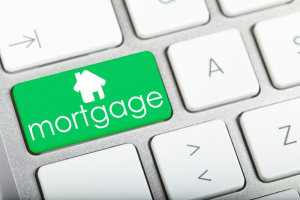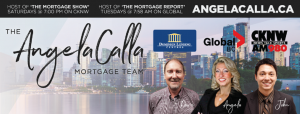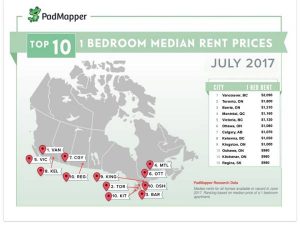
Last week Bank of Canada (BoC) Governor Poloz eliminated any doubt about the BoC’s near-term plans. During an interview on CNBC he said that the two 0.25% overnight-rate cuts that the Bank made in 2015 in response to the oil-price shock have “done their job” and he expressed confidence that our economy’s “surprisingly” strong first-quarter growth rebound would continue.
The market’s reaction was swift.
The futures market raised the odds of a BoC rate rise at its July meeting to better than 50% and the Loonie soared against the Greenback, reaching a nine-month high. Government of Canada (GoC) bond yields surged higher and mortgage lenders wasted no time, quickly raising their fixed rates, which are priced on GoC bond yields, in response.
This marks a rare moment for many of our variable-rate borrowers because the BoC hasn’t raised its overnight rate in more than seven years, which means there are many among this group who have never experienced a rate rise (this is the part where the older generations shake their heads).
Suddenly these borrowers have just been told by the BoC that their rates are going to go up and at the same time, they are nervously eyeing fixed mortgage rates, otherwise known as their conversion parachutes, moving higher.
In today’s post, I’ll explain why the BoC is planning to raise its overnight rate soon, offer my take on the impacts that this will have on our economy, and most urgently, offer my two cents on whether variable-rate borrowers should now convert to a fixed-rate mortgage.
The Canadian economy has performed much better of late. Our GDP rose by 3.7% on an annualized basis in the first quarter of this year (which led the G7 economies), our job growth has consistently exceeded consensus forecasts, and even our beleaguered export-manufacturing sector is showing signs of life.
That last point is key for the BoC because it has long said that any healthy economic recovery scenarios must be export led and underpinned by a strong and stable rise in business investment in our manufacturing sector. The health of this sector is vital because manufacturing jobs have a multiplier effect that stimulates job creation across our broader economy.
This newfound economic strength adds another worry to the Bank’s list because if our current economic momentum marks the beginning of a sustainable recovery, it must now try to stay in front of inflationary pressures. BoC Deputy Governor Carolyn Wilkens recently alluded to this when she said that “If you saw a stop light ahead, you would begin letting up on the gas to slow down smoothly … You don’t want to have to slam on the brakes at the last second. Monetary policy must also anticipate the road ahead.”
The BoC has lots of other reasons for wanting to begin raising its overnight rate. Our extended period of ultra-low interest rates has created potentially destabilizing risks that include:
-Rising household debt levels.
-The potential for asset bubbles.
-The deterioration of overall credit quality as investors reach for higher yields.
-Increasing long-term liability shortfalls from pension funds and insurance companies because they can’t earn the returns they need to cover their long-term
obligations.
-Limited future monetary-policy flexibility when the overnight rate is so close to 0% (it stands at 0.50% today).
If the BoC wants to make the case for raising rates in the here and now, the two emergency rate cuts that it made in response to the oil-price shock in 2015 are a good place to start. The Bank believes that our economy has now largely adjusted to lower oil prices, so if that economic emergency has been dealt with, why not remove the emergency rate cuts that accompanied it?
If the answer seems simple, it’s not.
When the BoC pulls its interest-rate lever it creates impacts that are far-reaching across our economy, and that cuts both ways. Here are some examples of the negative impacts that will accompany the BoC’s coming rate rise:
The Loonie will rise – The rising Loonie impacts our economy in many of the same ways as monetary-policy tightening. For example, it raises the costs of our exports, and the Loonie’s exchange-rate value has already been a headwind for our exporters. While it has fallen against the Greenback over the past several years, other currencies, like the Mexican Peso, have weakened more, making our exports relatively more expensive than the competition. The BoC has repeatedly expressed concern over these “competitiveness challenges” and it knows that higher rates will exacerbate them. That has to make raising now a tough call. We have been waiting a long time for our export sector to show signs of life and a BoC rate hike will increase the strength of the currency headwind that is acting against it.
Our government deficits will increase – Rate rises will increase the cost of government debt, and since our federal government and most of our provincial governments are already running deficits, higher borrowing costs will increase those shortfalls. As the cost of servicing our overall government debt load rises over time, there will be less money available for more productive long-term investments in things like infrastructure, education and research.
The risk of deflation will increase – The BoC’s primary mandate is to use its monetary policy to maintain price stability, and in layman’s terms, that basically means that they need to help keep inflation under control. Our current inflation levels are as low as they have been in almost a decade, at about 1.3%, and if rate rises slow our hard-won economic momentum, what little inflation we have could disappear. If that happens and we experience outright deflation instead, the BoC will regret having pumped its brakes, especially since its monetary-policy tools are far less well suited to reigning in deflationary forces.
The BoC might argue that now is the time to raise rates because the U.S. Federal Reserve has already raised its policy rate three times and is planning to raise it again in the near future (and the Bank of England and the European Central bank are suddenly sounding more hawkish as well).
For my part, I think the Fed is over-tightening based on current U.S. economic momentum and that its actions may well lead to a U.S. recession sometime within the next twelve months (for reasons that are beyond the scope of this post). While that view might be controversial, consider that past Fed tightening cycles have triggered a
U.S. recession about 80% of the time (according to research done by economist David Rosenberg).
If the U.S. economy enters a recession, the Fed will likely cut its policy rate back, and if that happens, the BoC would be expected to follow. But even if I’m wrong and the U.S. avoids recession, I don’t believe that history will mark this as the definitive moment when variable-rate borrowers should have locked in.
Here are five reasons why I hold this view:
Central bankers influence, but do not control interest rates – Interest rates have been pushed steadily lower by a variety of long-term factors such as aging demographics, slowing economic growth rates and long periods of low inflation in most developed countries. These factors will continue to exert downward pressure on our interest rates for many years to come. That doesn’t mean that rates won’t go up a little in response to monetary-policy changes, but it does make it very unlikely that we’re headed for a repeat of 1980s rates in the 18%+ range (as some borrowers fear).
Rates don’t need to rise by much to slow our economy – The BoC has repeatedly said that with our current debt levels, our economy will require less monetary-policy tightening to ease inflationary pressures and it has been consistently lowering its neutral-rate forecast to reflect this (as a reminder, the neutral rate is the rate “that is neither stimulative nor contractionary when an economy is operating at full capacity”). That means that if the BoC does raise rates it will be able to do more with less.
The cost of labour isn’t feeding inflationary pressures – The cost of labour is a pervasive driver of overall inflation, and while our economy’s employment momentum has been impressive, our average wages are barely rising. It’s true that labour costs are a lagging indicator, meaning that they tend to rise after overall inflation trends higher, but by any historical measure they should have increased by much more at this point in our economic recovery. And the fact that they haven’t suggests that other longer-term factors are at play, such as increased levels of automation. Flat labour costs will go a long way toward keeping inflation down.
Rates aren’t likely to go up in a straight line – It wasn’t too long ago that market watchers were speculating about the possibility of a BoC rate cut. If the BoC raises, the odds of a future rate cut will also increase, so don’t expect the BoC overnight rate to follow a straight upward line just because we see one or two rate hikes. The higher the overnight rate goes, the more flexibility the BoC has to lower it back again if needed (and which I think will happen if the U.S. economy lands in recession).
The bond market’s initial reaction may well prove to have been an over-reaction – Investors tend to shoot first and ask questions later, and the market’s reaction to the BoC’s hawkish guidance assumes that at least two overnight-rate increases are imminent. While that’s certainly possible, I think there is still a good chance that the second increase could either be delayed or may not even happen, and if that proves the case, bond yields will move back down as rumour and speculation turn to fact.
Our history says that variable-rate borrowers who convert tend to pay more over time than if they had stayed the course. While past is not necessarily prologue, in his famous fifty-year study that compared fixed and variable mortgage rates, Dr. Moshe Milevsky found that variable-rate borrowers who convert mid-term typically paid more than variable-rate borrowers who stuck it out. In other words, converting your variable rate today will give you peace of mind, but history says that you will probably be locking in additional cost over the long run.
Five-year GoC bond yields surged higher by twenty-eight basis points last week, closing at 1.40% on Friday. Five-year fixed-rate mortgages are still available at rates as low as 2.34% for high-ratio buyers (but not for much longer), and at rates as low as 2.59% for low-ratio buyers, depending on the size of their down payment and the purchase price of the property. Meanwhile, borrowers who are looking to refinance should be able to find five-year fixed rates in the 2.79% to 2.89% range.
Five-year variable-rate mortgages are largely unchanged so far and are still available at rates as low as prime minus 0.80% (1.90% today) for high-ratio buyers, and at rates as low as prime minus 0.50% (2.20% today) for low-ratio buyers, again depending on the size of their down payment and the purchase price of the property. Borrowers who are looking to refinance should be able to find five-year variable rates around the prime minus 0.40% to 0.45% range, which works out to between 2.20% and 2.25% using today’s prime rate of 2.70%.
The Bottom Line: If you’re a fixed-rate borrower, the worst of the rate hikes is likely behind you for the time being because lenders have already adjusted their pricing in response to rapidly rising GoC bond yields. If you’re a variable-rate borrower, my view is that staying the course instead of converting, at least for now, will still prove the better option. While your variable rate may be headed higher soon, for the reasons outlined above, I don’t think the rise will be dramatic, as many now suddenly fear.
Click Here to Read the Article!
The best mortgage plan is one that is developed by assessing your goals and life stage. The Angela Calla Mortgage Team will help you personally call us at 604-802-3983 or email callateam@dominionlending.ca. To contact Angela Calla directly call 604-802-3983 or visit www.angelacalla.ca





